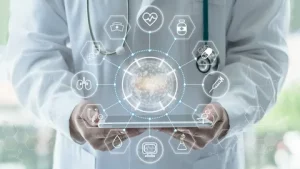In the 21st century, the intersection of technology and health has emerged as a transformative force, reshaping the landscape of global health. Advancements in technology have not only revolutionized medical practices but have also enhanced the accessibility, efficiency, and quality of healthcare worldwide. This article explores the multifaceted impact of technology on global health, focusing
In the 21st century, the intersection of technology and health has emerged as a transformative force, reshaping the landscape of global health. Advancements in technology have not only revolutionized medical practices but have also enhanced the accessibility, efficiency, and quality of healthcare worldwide. This article explores the multifaceted impact of technology on global health, focusing on key areas such as telemedicine, artificial intelligence (AI), wearable technology, electronic health records (EHRs), and health information systems.
Telemedicine: Bridging the Gap
Telemedicine has become a cornerstone of modern healthcare, particularly in remote and underserved regions. By leveraging telecommunications technology, telemedicine enables healthcare providers to deliver medical consultations, diagnoses, and treatments to patients regardless of geographical barriers. This has proven especially beneficial in rural areas where access to specialized care is often limited.
The COVID-19 pandemic accelerated the adoption of telemedicine, highlighting its potential to maintain continuity of care during crises. Patients can now consult with healthcare professionals via video calls, reducing the need for in-person visits and minimizing the risk of infection. Moreover, telemedicine has facilitated the management of chronic diseases, mental health services, and follow-up care, contributing to improved patient outcomes and satisfaction.
Artificial Intelligence: Revolutionizing Diagnostics and Treatment

Image by : Yandex
Artificial intelligence (AI) has made significant inroads in the field of healthcare, offering unprecedented opportunities for diagnostics, treatment, and personalized medicine. AI algorithms can analyze vast amounts of medical data, including imaging studies, genetic information, and electronic health records, to identify patterns and make accurate predictions.
In diagnostics, AI-powered tools have demonstrated remarkable accuracy in detecting diseases such as cancer, diabetic retinopathy, and cardiovascular conditions. For instance, AI algorithms can analyze medical images to identify early signs of tumors that may be missed by human radiologists. This early detection is crucial for improving survival rates and reducing the burden of disease.
AI is also transforming treatment protocols through personalized medicine. By analyzing a patient’s genetic makeup and medical history, AI can recommend tailored treatment plans that maximize efficacy and minimize adverse effects. This approach holds promise for conditions like cancer, where personalized therapies can target specific genetic mutations, leading to better outcomes and fewer side effects.
Wearable Technology: Empowering Patients
Wearable technology has gained popularity as a means of empowering individuals to take control of their health. Devices such as smartwatches, fitness trackers, and continuous glucose monitors provide real-time data on various health metrics, including heart rate, physical activity, sleep patterns, and blood glucose levels.
These devices enable individuals to monitor their health and make informed lifestyle choices. For example, fitness trackers can motivate users to achieve their daily exercise goals, while continuous glucose monitors help diabetics manage their blood sugar levels more effectively. Additionally, wearable technology can alert users to potential health issues, prompting timely medical intervention.
In clinical settings, wearable devices offer valuable data for healthcare providers, facilitating remote monitoring and early detection of health problems. This is particularly beneficial for managing chronic diseases, where continuous monitoring can prevent complications and reduce hospitalizations.
Electronic Health Records: Enhancing Efficiency and Coordination
Electronic health records (EHRs) have revolutionized the way medical information is stored, accessed, and shared. EHRs provide a comprehensive digital record of a patient’s medical history, including diagnoses, treatments, medications, and test results. This centralized repository of information enhances the efficiency and coordination of care, leading to better patient outcomes.
EHRs improve communication among healthcare providers, ensuring that critical information is readily available when needed. This is particularly important for patients with complex medical conditions who require care from multiple specialists. EHRs also reduce the risk of medical errors by providing accurate and up-to-date information, minimizing the likelihood of duplicate tests and adverse drug interactions.
Furthermore, EHRs facilitate data-driven decision-making and population health management. By analyzing aggregated data from EHRs, healthcare organizations can identify trends, track disease outbreaks, and implement preventive measures. This capability is crucial for addressing public health challenges and improving the overall health of communities.
Health Information Systems: Strengthening Public Health
Health information systems (HIS) play a critical role in strengthening public health infrastructure and improving population health outcomes. These systems collect, store, and analyze health data from various sources, providing valuable insights for policymakers, healthcare providers, and researchers.
HIS enable the surveillance of infectious diseases, allowing for the early detection and containment of outbreaks. For example, during the COVID-19 pandemic, health information systems were instrumental in tracking the spread of the virus, identifying hotspots, and allocating resources effectively. This real-time data was crucial for informing public health interventions and mitigating the impact of the pandemic.
In addition to disease surveillance, HIS support health program management and evaluation. By monitoring the performance of health programs and interventions, HIS help identify areas for improvement and optimize resource allocation. This ensures that health initiatives are effective and sustainable, ultimately leading to better health outcomes for populations.
Challenges and Future Directions

Image by : Yandex
While the impact of technology on global health is overwhelmingly positive, several challenges must be addressed to fully realize its potential. One major challenge is the digital divide, which refers to the disparity in access to technology between different populations. In many low- and middle-income countries, limited infrastructure, internet connectivity, and digital literacy hinder the adoption of health technologies.
To bridge this gap, it is essential to invest in infrastructure development, provide training and education, and implement policies that promote equitable access to technology. Additionally, addressing concerns related to data privacy and security is crucial to maintaining patient trust and ensuring the ethical use of health data.
Looking ahead, the future of technology in global health holds immense promise. Innovations such as blockchain for secure health data exchange, advanced genomics for personalized medicine, and telehealth platforms for mental health support are poised to further transform healthcare delivery. By harnessing the power of technology, we can continue to improve health outcomes, reduce disparities, and create a healthier world for all.
Conclusion
The impact of technology on global health is profound and far-reaching. From telemedicine and artificial intelligence to wearable technology and electronic health records, technological advancements are revolutionizing healthcare delivery, improving patient outcomes, and strengthening public health systems. While challenges remain, the continued integration of technology into healthcare holds the potential to address some of the most pressing health issues of our time and create a more equitable and efficient global health landscape. As we move forward, it is imperative to embrace these innovations and ensure that their benefits are accessible to all, paving the way for a healthier and more connected world.




















